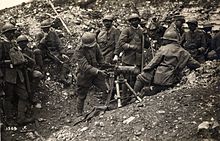Seventh Battle of the Isonzo
| Seventh Battle of the Isonzo | |||||||||
|---|---|---|---|---|---|---|---|---|---|
| Part of the Italian Front (First World War) | |||||||||
 Italian troops with a captured Austrian machine gun | |||||||||
| |||||||||
| Belligerents | |||||||||
|
|
| ||||||||
| Commanders and leaders | |||||||||
|
|
| ||||||||
| Strength | |||||||||
|
240 battalions 1,150 artillery pieces |
150 battalions 770 artillery pieces | ||||||||
| Casualties and losses | |||||||||
| 17,000–21,000 | 20,000[1] | ||||||||
The Seventh Battle of the Isonzo was fought from September 14–17, 1916 between the armies of the Kingdom of Italy and those of Austria-Hungary. It followed the Italian successes during the Trentino Offensive and the Sixth Battle of the Isonzo in the spring of 1916.[2]
Battle
[edit]A short, sharp encounter fought from 14 to 17 September 1916, the Seventh Battle of the Isonzo saw Italian Chief of Staff Luigi Cadorna shift his focus from broad-based diversionary attacks to tightly focused initiatives directed at single targets.[3] This latest Isonzo battle saw the Italian Third Army, with a large amount of artillery, attack on the Carso toward Nova Vas. Following a successful first day, Nova Vas was assaulted on the second day with substantial artillery bombardments on German bunkers. Within minutes of the Italians ceasing fire, the Austro-Hungarian forces surrendered.[4]
Nevertheless, Cadorna's continued offensives along the Soča (Isonzo) did succeed in wearing away at Austro-Hungarian resources, both in terms of manpower and in crucial artillery availability. As each battle proceeded the Italians' war of attrition seemed ever more likely to wear the Austro-Hungarians into defeat, short of assistance from their German allies.
The Eighth Battle of the Isonzo followed on 10 October 1916.[5]
See also
[edit]- First Battle of the Isonzo - 23 June–7 July 1915
- Second Battle of the Isonzo - 18 July–3 August 1915
- Third Battle of the Isonzo - 18 October–3 November 1915
- Fourth Battle of the Isonzo - 10 November–2 December 1915
- Fifth Battle of the Isonzo - 9–17 March 1916
- Sixth Battle of the Isonzo - 6–17 August 1916
- Eighth Battle of the Isonzo - 10–12 October 1916
- Ninth Battle of the Isonzo - 1–4 November 1916
- Tenth Battle of the Isonzo - 12 May–8 June 1917
- Eleventh Battle of the Isonzo - 19 August–12 September 1917
- Twelfth Battle of the Isonzo - 24 October–7 November 1917 also known as the Battle of Caporetto
References
[edit]- ^ "La Grande Guerra 1914 - 1918".
- ^ Willmott, H.P. (1994). The Historical Atlas of World War I. Swanston Publishing Limited. ISBN 0-8050-2651-7.
- ^ .Schindler, John R. (2001). Isonzo: The Forgotten Sacrifice of the Great War. Praeger. ISBN 0275972046. OCLC 44681903.
- ^ Evans, Martin (2003). Forgotten Battlefronts of the First World War. Sutton Publishing Limited. pp. 144–145. ISBN 0-7509-3004-7.
- ^ Evans, Martin (2003). Forgotten Battlefronts of the First World War. Sutton Publishing Limited. p. 146. ISBN 0-7509-3004-7.
External links
[edit]- FirstWorldWar.Com: The Battles of the Isonzo, 1915-17
- Battlefield Maps: Italian Front
- 11 battles at the Isonzo
- The Walks of Peace in the Soča Region Foundation. The Foundation preserves, restores and presents the historical and cultural heritage of the First World War in the area of the Isonzo Front for the study, tourist and educational purposes.
- The Kobarid Museum (in English) Archived 2007-11-19 at the Wayback Machine
- Društvo Soška Fronta (in Slovenian)
- Pro Hereditate - extensive site (in En/It/Sl)
